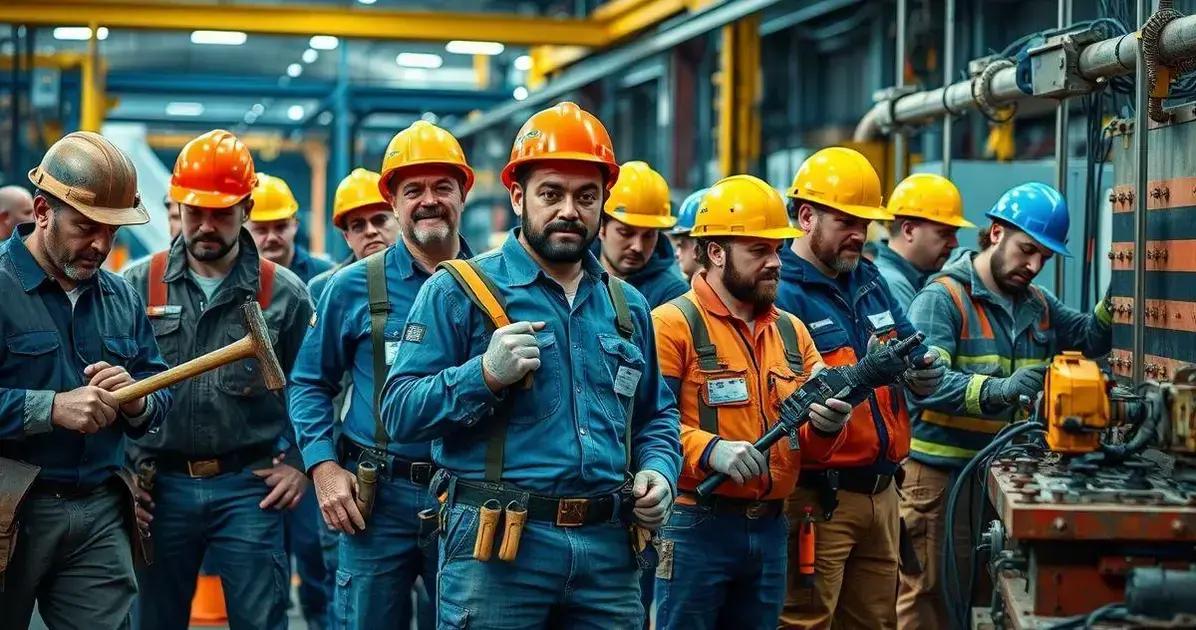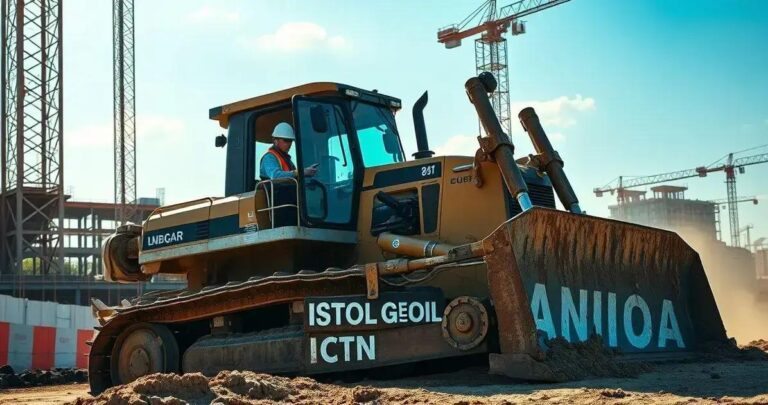Blue Collar Careers: Unlocking Opportunities in Hands-On Industries
Anúncios
**Blue Collar Careers** offer a world of opportunities for those who prefer hands-on work, away from the confines of a traditional office environment. These careers are vital to the economy, spanning industries such as construction, manufacturing, and healthcare. With a strong emphasis on skills, training, and education, blue collar workers keep the world moving. In this article, we’ll delve into the diverse paths available, the importance of these roles, and what the future holds for those who choose this rewarding journey.
Exploring Diverse Blue Collar Career Paths
In the realm of blue collar careers, there is a vast array of opportunities that cater to different skills and interests. From working on construction sites to operating complex machinery, the diversity in career paths is immense and fulfilling.
Construction and Skilled Trades
Consider the world of construction and skilled trades, where professionals work on building, repairing, and maintaining structures. Electricians, plumbers, and carpenters are essential in creating the infrastructure that supports our daily lives.
Manufacturing and Production
Manufacturing roles play a crucial role in producing the goods we use every day. Workers in this sector operate machinery, assemble products, and ensure quality control to maintain high standards in production.
Transportation and Logistics
Another exciting field is transportation and logistics, where individuals manage the movement of goods and people. Truck drivers, forklift operators, and logistics coordinators are key players in ensuring products reach their destinations efficiently.
Each career path in the blue collar sector offers unique experiences and the chance to develop specialized skills. The hands-on nature of these jobs provides a tangible sense of achievement and contribution to society.
Discovering Your Path
Finding a career path that matches your skills and interests is crucial. Consider what aspects of hands-on work excite you and explore the multitude of opportunities available. With the right training and dedication, a fulfilling career in the blue collar sector awaits.
The Importance of Blue Collar Jobs in Today’s Economy

Blue collar jobs are the backbone of our economy, providing essential services and goods. These roles keep industries such as construction, manufacturing, and transportation thriving. Without these dedicated workers, daily life would come to a halt.
Driving Economic Growth
Industries that rely heavily on blue collar workers contribute significantly to economic growth. They create products, build infrastructure, and offer services that fuel business operations across sectors.
Job Stability and Demand
Many blue collar sectors offer stable and well-paying jobs. Skilled trades, such as electricians and mechanics, are in constant demand, ensuring job security and opportunities for advancement.
Vital to Infrastructure
Our infrastructure relies on blue collar workers to build and maintain roads, bridges, and buildings. Their expertise ensures safety and efficiency in public and private structures.
These jobs not only support individuals and families but also communities and the broader economy. Recognizing their importance is crucial in fostering appreciation and investment in these careers.
Essential Skills for Succeeding in Blue Collar Careers
To thrive in blue collar careers, acquiring the right skills is essential. Technical expertise forms the foundation, with roles often requiring proficiency in tools, machinery, or specific trade skills.
Technical Skills
Understanding machinery operation, electrical systems, or carpentry techniques can provide a significant edge. Practical know-how is gained through hands-on training and experience.
Problem-Solving Abilities
Being able to think critically and solve on-the-job challenges is crucial. Whether it’s troubleshooting equipment issues or improving processes, problem-solving is a valued skill.
Physical Stamina and Dexterity
Many blue collar jobs demand physical endurance and coordination. This includes the ability to handle tools, move efficiently, and maintain energy throughout long workdays.
Teamwork and Communication
Collaboration with others is often a daily requirement. Effective communication skills help in coordinating with teammates and ensuring safety and quality in projects.
The right combination of skills not only enhances job performance but also opens up pathways for career advancement. Investing time in developing these skills can lead to long-term success in the industry.
Training and Education for Blue Collar Professions

Pursuing blue collar professions often involves specialized training and education. Apprenticeships are a popular pathway, offering hands-on experience under the guidance of seasoned professionals.
Vocational and Technical Schools
These institutions provide focused courses in areas like welding, electrical work, and plumbing. They equip students with practical skills needed to perform in their chosen fields.
Certification Programs
Many blue collar jobs require certifications to ensure workers meet industry standards. These programs validate skills and can improve job prospects.
On-the-Job Training
Learning while working is common in blue collar careers. This approach allows workers to gain practical experience while earning a paycheck.
Continuous Learning
As technology evolves, staying updated with the latest tools and techniques is crucial. Workshops and online courses can help workers stay competitive.
The right combination of formal education and hands-on training can unlock numerous opportunities in blue collar industries. Investing in education ensures a strong foundation for career success.
Navigating Challenges in Blue Collar Work
Working in blue collar careers presents unique challenges, ranging from physical demands to workplace safety concerns. These factors require workers to be vigilant and proactive.
Physical Demands and Safety
Many jobs involve strenuous activities. Wearing protective gear and following safety protocols can help prevent injuries and accidents.
Economic Fluctuations
Industries like construction and manufacturing can be affected by economic shifts. Workers must be adaptable, ready to move between projects as demand changes.
Skill Updates and Training
Keeping up with evolving technology and techniques is crucial. Continuous learning and training are needed to remain competitive in the job market.
Work-Life Balance
The demands of blue collar work can impact personal time. Time management skills and recognizing when to rest are important for maintaining health and well-being.
By understanding and addressing these challenges, blue collar workers can navigate their careers more effectively, leading to a fulfilling and successful professional journey.
The Future of Blue Collar Careers: Trends and Predictions

The landscape of blue collar careers is shifting, driven by technology and evolving industry needs. Understanding these trends can help workers stay ahead and capitalize on emerging opportunities.
Technological Advancements
Automation and robotics are reshaping industries like manufacturing and logistics. Learning to work alongside these technologies can boost efficiency and safety.
Green Energy and Sustainability
Demand for sustainable practices is rising. Careers in renewable energy, like solar and wind installation, are becoming more prominent and offer growth potential.
Increased Skill Diversification
Workers are encouraged to expand their skills beyond traditional roles. This diversification can provide more job opportunities and career stability.
Flexible Work Arrangements
Remote monitoring and digital tools allow for more flexibility in work locations and hours, offering better work-life balance.
Keeping an eye on these developments ensures blue collar workers are not only prepared for the future but can also lead and innovate in their fields.
Conteúdo não disponível
FAQ – Frequently Asked Questions About Blue Collar Careers
What are the key benefits of blue collar careers?
Blue collar careers provide hands-on work opportunities, job stability, and the chance to develop specialized skills. They are essential for maintaining economic growth and infrastructure.
How can I start a career in blue collar industries?
Begin by acquiring relevant training through apprenticeships, vocational schools, or certification programs. Gaining technical skills and hands-on experience is crucial.
What challenges do blue collar workers face?
Common challenges include physical demands, safety concerns, adapting to economic changes, and staying updated with new technologies.
What role does technology play in the future of blue collar careers?
Technology is introducing automation and efficiency, shaping industries such as manufacturing and logistics. Workers will need to adapt and learn to work alongside new technologies.
How important is continuous learning in these careers?
Continuous learning is vital to keep up with evolving tools and industry standards, ensuring competitiveness and career advancement opportunities in blue collar fields.
What opportunities do trends in green energy present for blue collar professionals?
With rising demand for sustainable practices, careers in renewable energy, like solar and wind installation, offer potential for growth and innovation.






